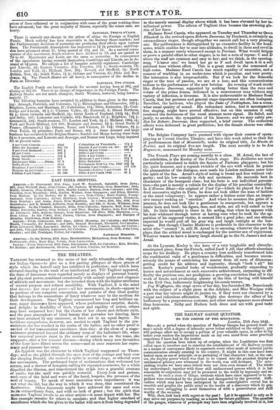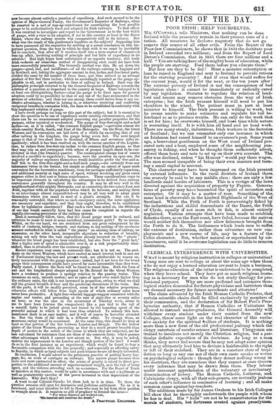THE RAILWAY GAUGE QUESTION.
TO THE EDIT= Or THE IHT.CTATOH.
London, 25th June 1846.)
Sin—At a period when the question of Railway Gauges has pressed itself on men's minds with a degree of intensity never before exhibited on the subject, you will perhaps allow me to occupy a portion of your valuable space, in order to lay before your readers the impressions made on my own mind from some practical experience I have had in the matter. Had the question been taken up ab origin, when the Legislature was first called upon to interfere and to sanction the establishment of the Railway system as a means of conveyance likely to supersede every other mode of internal public communication already existing in the country, it might in this case have been looked upon as one of principle, or as partaking of that character: but, at the out- set, the mighty power which was thus to be roused into the grandest display of mechanical potency ever witnessed in the world, was still dormant. The asto- nishing results we have since beheld were not then even dreamt of. The whole lay undeveloped; together with those still undiscovered powers which it is but reasonable to conjecture may yet be presented to the world by ingenuity and re- search. In such a state of things, methods which have since appeared to be ex- pedient were overlooked by the practical and disregarded by the powerful. Diffi- culties which may have been anticipated by the contemplative served but to unsettle and perplex the public mind on the merits of a discovery which its pre: moters were struggling to avail themselves of with a perseverance and skill worthy of the occasion.
Why, then, look back with regret on the past? Let it be appealed to only as it may serve our purposes by teaching us a lesson for futuregnidance. The question of the gauges, whatever of principle may have been originally involved in it, has
now become almost entirely a question of expediency. And such seemed to be the opinion of Major-General Pasley, the Government's Inspector of Railways, when he resorted to a sort of toss-up contrivance for ascertaining the best possible gauge to be authoritatively fixed and adopted for Irish railways. To that officer rt was remitted to investigate and report to the Government as to the best width of gauge, with a view to its adoption, if not in this country at least in the Sister Island, where the railway system was comparatively still in its infancy. But what was the result of this gentleman's inquiries on the subject? Supposing him to have possessed all the requisites for arriving at a sound conclusion on this im- portant question, from the way in which he dealt with it we must be inevitably led to conclude, that after all it resolves itself into a mere matter of chance—a toss-up affair, involving nothing of principle and but little of expediency in its solution! Had high hopes been entertained of an opposite tendency, this truly Irish ',aimed° ad absurdum method of disappointing such could not have been more successfully practised. The General's method was this. He set down the ges—good, bad, and indifferent—of all the railways existing in England and ur Scotland, and, diking the aggregate amount in feet, mches,and fractional parts, divided the same by the number of these lines, and thus arrived at an average produot of five feet three inches; which he accOrdingly. reported as the gauge ap- plicable to all, and in particular to lines of railway in Ireland. Such was the philosopidcprencipie resorted to by the General Inspector of Railways towards the solution of a question so important to the country at large. There belonged to it at least one distinguishing feature—that the gauge to be fixed upon for general adoption could by no possibility be that of any one of the lines enumerated in the process of selection; and thus-not one among them could derive from it any ex- clusive advantages: whether in joining in, or otherwise receiving and conferring reciprocal benefits in connexion with, the lines to be established in conformity with thialiaphazard solution of gauge. I. have dwelt perhaps too long on this part of the subject; but it is essential to show the question to be one of expediency under existing circumstances, and that there can be no measurement adopted possessing any peculiar properties for the purpose, either mystical or mechanical. The gauge of fonr-feet-eight-and-a-half niches—or, as it is called, "the common English gauge"—pervades almost the whole country North, South, and East of the M.enropolis. On the West, the Great Western and its connexions are laid down of a width far exceeding that of any other railway in the kingdom, the gauge being seven feet. The next largest gauge is that of two short lines in Scotland, of fifteen and seventeen miles re- spectively; which it has been resolved on, with the recent sanction of the Legisla- ture, to reduce from five-feet-six-inches to the common English gauge, so that They may join on and correspond with others of greater length about to he con- structed in that (the Dundee) quarter. The contemplated change has of course involved a sacrifice to expediency; because, were the question an open one, the majority of railway engineers themselves would doubtless prefer the five-and-a- half feet to the- four-feet-eight-and-a-half-inch gauge,—not certainly from any talismanic virtue in the former, but simply as affording an extent of space more convenient- for the locomotive Machinery, room for carriages sufficiently capacious, and additional security at high rates of speed, without involving any great extra expense either in first cost or future maintenance. These considerations come to be important elements in calculating the advantages to be derived from railway conveyance generally Throughout the country. It may be all very well in the neighbourhood ofthis mighty Metropolis, and as connecting the two coasts East and West, together with all the populous towns which lie between, and uniting them in an interchange almost unparalleled—it may be all very will to adopt giant dimensions where you stand in need of a giant's strength. But can it be reasonably contended, that where no such emergency exists, the same appliances rte necessary and expedient; and that they ought, therefore, to be established there by legislative enactment? Had such a view been acted on, the Sibthorps of our day would assuredly have had less cause for complaint as regards the rapidly mcreasingp valence of the railway system. Does at necessarily follow, then,, that the broad gauge must he reduced, and extremes be made to meet at some undefined, intermediate point? By no means. Whilst, on the one hand, we are restricted from any great enlargement by the width of viaducts,. bridges, tunnels, and stations, to say nothing of the enormous ameunt embarked.m.what is called " the plants " on existing lines of. railway we encounter, on the other hand, insuperable objections to reduction of breadth; arising not only from the vast expenditure already incurred on the " plants " wherever the broad gauge has been established, but also from the " great fact," that a higher rate of speed is admissible over it, at a risk proportionably dimi- nished; than is attainable over the common gauge. Recent experience may seem to controvert this; but it is not so. The and- dents on the Great Western, which have excited so much interest both in and out of Parliament daring the last and present week, are attributable to causes en- tirely unconnected with the gauge question: indeed, had it not been for the broad gauge theirtheir conIsequ.eneveese tileiecttohay.elpfoovr far to stand latimzustable than zail and the longitudinal sleeper adopted by Mr. Brunel for the Great Western have a tendency to produce a. splines/ reaction to the passing trains. This occasions an easy,, smooth motion; and at rates of speed even much higher than The ordinary rates, the risk is not increased in proportion, owing to what we shall call the greater breadth of base and the ponderous dimensions of the train. But all the parts, it will be readily perceived, must be of due relative proportions; otherwise effects will follow from high speeds of which ordinary rates have never been productive. A light four-wheeled luggage-waggon connected with the engine and tender, and proceeding at the rate of sixty-five or seventy miles an hour, as was the case in the occurrence of Tuesday week, seems to me to have been (excuse the comparison) like a pan tied to the tail of a mastiff, liable to be jerked about and tossed by the bounding speed of the powerful animal to which it had been thus attached. To remedy this last- mentioned. limit is an. easy matter, and it will of course be hereafter attended to. But the form of the rails is a different affair. To change these, an enormous outlay would be occasioned. At the same time, this should be done at Ieast on that portion of the line between London and Slough. The flat hollow plates of the Great Western, presenting as they do a much greater breadth than depth of section to the action of the stress to which they are subjected, are far less calculated for resistance than are those of the common form; which possess other advantages which I cannot now advert to. But why, it may be asked, restrict the improvement to the London and Slough portion Alm line? I would
i
de so in the first instance as an experiment., which would be found to bear a favourable comparison with the line generally; and especially as affording safety to Royalty, in which as loyal subjects and good citizens we are all deeply interested. . In conclusion, I would advert to the pernicious practice of putting heavy lug- gage, &c, on roofs of carriages on railways. 'The narrow gauge becomes thus more and more contracted in effect: the centre of gravity is raised in direct pro- portion to the additional amount of superincumbent weight, as is the risk of being %wet, and the violence attending such an occurrence. For the Board of Trade to interfere in this matter, would be quite in accordance with and a legitimate as well as praiseworthy exercise of the power intrusted to that department of the Executive. Why don't they? A word Motu Colonial Mends: let them look to it in time. To them the question remains still open for discussion and judicious settlement. To us it is foreclosed, and must therefore be left to those who may be led from their position to wrangle about it. It requires no gift of prophecy to foretell the issue-
For when disputes are wearied out, 'TM interest still resolves the doubt."
A PEAL-mai. Eacarmsrai.



























 Previous page
Previous page